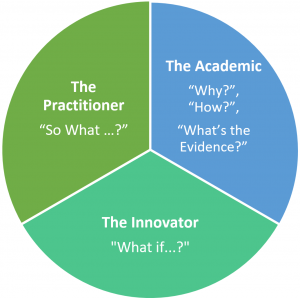14 At the Conference
Approaching your Presentation
At the beginning of the conference, review the daily schedule to identify poster and oral presentations, plenaries, and other events that you are interested in attending, making sure to note the time and location that you will be presenting your work. Although conference norms around leaving and entering sessions may vary, plan on attending all of the presentations that will occur in the same session as yours as a matter of etiquette. Come prepared with your presentation materials and speaking notes as applicable, and arrive early to introduce yourself to the moderator and other presenters, and to ensure your technology is compatible and ready to go.
The Question Period
Navigating the question period after your presentation can often one of the most nerve-wracking elements of an academic presentation. To help allay your nerves, practice your presentation with colleagues and non-expert friends before going to anticipate the questions that may arise. It may also be useful to consider different types of audience members you may encounter:

- The Practitioner: Audience members in this group are typically interested in the practical implications of your research, and how they might apply your research findings in their own practice. They ask questions that ask you to consider what your research contributes to the field.
- The Academic: Audience members in this group are typically interested in the theory and methodology that underpin your research, and how the specific details of your research process support your conclusions. They ask questions that ask you to reflect on or examine the rigor, strengths and weaknesses of your work.
- The Innovator: Audience members in this group are typically interested in the broader implications of your research, and in imagining new ways of interpreting or applying your results or methods. They ask questions that ask you to consider how your research might be continued or changed in the future.
Although conference Q+As are often framed as opportunities for audience members to ask questions of presenters, you may also wish to solicit advice or insights from your audience by asking specific questions. This can help foster discussion, especially when you find that your audience quiet or not forthcoming with questions of their own.
Connecting with Other Attendees
Although socializing at conferences can feel daunting, developing professional contacts is a critically important aspect of the conference experience. This can occur inter personally, after presentations or during other conference events, or online, by engaging with other researchers on platforms like Twitter and using conference hashtags. At the same time, it’s also okay to take time for yourself at conferences, especially if you are finding yourself overwhelmed by the social demands of attending. If you have traveled, include time in your conference schedule to experience the place you are visiting; if you feel comfortable, inviting professional colleagues to join you can be a great way to build new relationships with future collaborators.

Recommended Resources:
How to Get The Most Out of Conferences by Scott Berkun at his personal blog
Crash Course On Socializing At A Scientific Conference Dinner by Julio Peironcely at The Thesis Whisperer
